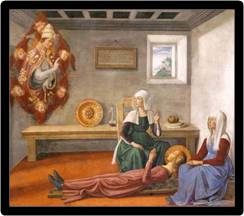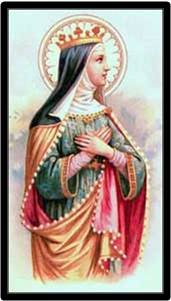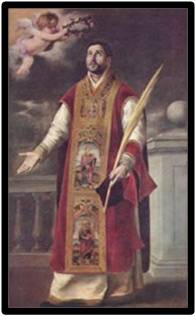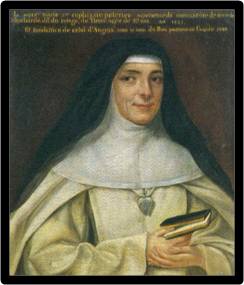
Seraphina was born in a little Italian town called San Geminiano, Tuscany. Her parents had once been rich, but difficult times had made them poor. Seraphina, or Fina, as her family affectionately called her, was their pretty and lively daughter who had a generous nature.
Each day she saved half of her dinner for someone in the town poorer than she was. During the day she sewed and spun cloth to help the family with expenses. At night, she usually spent a long time praying to Jesus and Mary.
When she was still quite young, her father died. Soon after, Fina was struck with an illness that deformed and paralyzed her. She found it very painful to move and had to be carried everywhere on a board. Fina lay for six years on wooden planks.
Pain rushed through her whole body and the only way she could bear it was to think of Jesus as he was nailed to the cross. “I unite my sufferings to yours, Jesus,” she would whisper. Sometimes, when the pain was just too much, she would say, “It is not my wounds but yours, O Christ, that hurt me.”
Fina was left alone for many hours every day because her mother had to go out to work or beg. The neighbors knew about Fina, but her sores smelled so bad that people made excuses not to go and visit her.
Then suddenly, Fina’s mother also died and she was left alone. Only one neighbor, her good friend Beldia, came to care for her giving Fina as much attention as she could, but Fina had to be left alone most of the time. Fina knew that she could not live much longer but she refused to lose heart.
Someone talked to her about the terrible sufferings St. Gregory the Great had to undergo during his life. Fina became devoted to him and although she did not join the order, she lived the rest of her life following the Benedictine rule.
One day, as she groaned in pain, St. Gregory appeared to her. He said kindly, “Child, on my feast day God will grant you rest.” which in older calendars was celebrated on March 12 that was the day he died in 604. And as promised, on March 12, 1253, St. Gregory came to take Fina home to heaven.

St. Matilda was the daughter of Count Dietrich of Westphalia, Germany and Reinhild of Denmark. When Matilda was still quite young, her parents arranged her marriage to a nobleman named Henry. Soon after their marriage, Henry became king of Germany.
As queen, Matilda lived a simple life with times for daily prayer. Everyone who saw her realized how good and kind she was. She was more like a mother than a queen. Matilda loved to visit and comfort the sick. She taught the ignorant, helped prisoners and did not let herself be spoiled by her position, but tried to reach out to people in need.
King Henry realized that his wife was a very special person. He often told her that he was a better person and a better king because she was his wife. Even though their marriage had been arranged, Henry and Matilda loved each other very much.
Matilda was free to use the treasures of the kingdom for her charities and Henry never asked her how she planned to use it. In fact, he became more aware of the needs of people. He realized that as king he had the power to lessen their suffering. They were happily married for twenty-three years.
Then King Henry died quite suddenly in 936. The queen was very sad and felt his loss very much. She made up her mind to live for God alone. So she called the priest to celebrate Mass for King Henry’s soul. Then she gave the priest all the jewels she was wearing to show that she meant to give up the things of the world from then on.
Although she was a saint, Matilda made one big mistake. She favored her son, Henry, more than her son, Otto, in the struggle to be king but she was later very sorry for having done this. She made up for it by accepting without complaint the sufferings that came her way.
She spent the rest of her years, and practicing charity and penance. St. Matilda died peacefully in 968 and was buried beside her husband.




